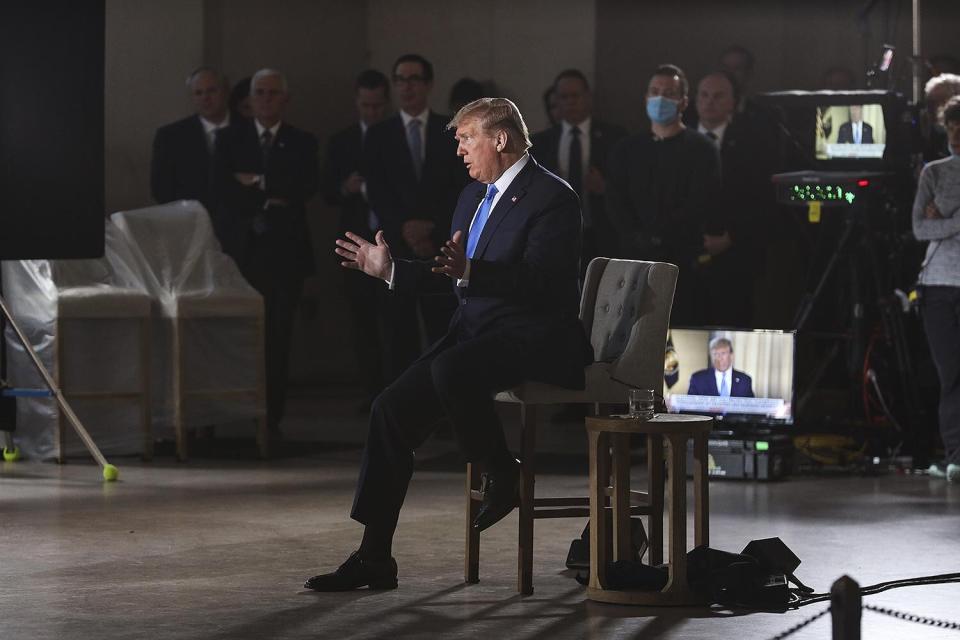Donald Trump Complains That He’s Been ‘Treated Worse’ Than Assassinated President Abraham Lincoln
President Donald Trump whined Sunday night that he's been harassed by a "hostile press" and claimed that he's been treated worse than President Abraham Lincoln, who was assassinated in 1865.
"I am greeted with a hostile press the likes of which no president has ever seen," Trump, 73, claimed Sunday night during a Fox News virtual town hall in front of the Lincoln Memorial.
"The closest would be that gentleman right up there," Trump said while pointing at Lincoln's statue. "They always said nobody got treated worse than Lincoln. I believe I am treated worse."
Trump's comments came as an answer to a remote question from a woman who expressed her support for the president but complained about him using divisive language and “descriptive words that could be classified as bullying."
“The U.S.A. needs you,” she said. “Please hold on to your wonderful attributes that make you our great leader and let go of other characteristics that do not serve you.”
The president's whining response drew immediate backlash online.
"Lincoln was assassinated, but that’s nothing compared to Trump having to answer questions from reporters," CNN commentator Keith Boykin tweeted.

Shutterstock President Donald Trump speaks with Fox News in front of the Lincoln Memorial in Washington D.C. on Sunday night.
This isn't the first time President Trump has compared himself with Lincoln.
Trump tweeted a similar claim last January. "At the same time there has been no president who has accomplished more in his first two years in office!" Trump said then.
Within his first two years in office, Lincoln signed the Emancipation Proclamation and ended slavery.
In 2017, Trump — who has a history of tweeting Lincoln quotes — also claimed at a campaign rally that he could be more presidential than any U.S. president "with the exception of the late, great, Abraham Lincoln."
"It's real easy," Trump said at the time.
But on Sunday, the president couldn't help but fall back on his familiar complaints about the press — something he's made a habit of throughout his presidency and ramped up over the last month while interacting with reporters daily during the White House's coronavirus task force briefings.
“They come at you with the most horrible, horrendous, biased questions," Trump complained.
RELATED: Donald Trump Tangles with Yet Another Reporter Over Coronavirus: 'Keep Your Voice Down'

Oliver Contreras/POOL/EPA-EFE/Shutterstock President Donald Trump speaking during Sunday night's virtual town hall, hosted by Fox News.
Trump has regularly tussled with reporters in recent weeks, calling journalists "nasty" and telling others to "just relax” during the briefings.
The interactions led to a number of pointed exchanges between the president and specific reporters.
Trump snapped at NBC’s Peter Alexander in March after the journalist asked, “What do you say to Americans who are watching you right now who are scared?”
“I say that you’re a terrible reporter,” Trump replied. “That’s what I say. I think that’s a very nasty question.”
The daily briefings seemingly came to an end starting last week after President Trump floated what doctors called a "dangerous" and incorrect idea to have federal health officials look into the possibility of injecting disinfectants into people to kill the coronavirus.
Since then, the president's interactions with the media have been more limited — though he's still criticizing the press on Twitter, tweeting about "Fake News" six times over the weekend.
Fox News anchor Bret Baier, who was one of the moderators interviewing Trump on Sunday night, told PEOPLE on Friday that he dislikes the president's coined term.
"I've said many times in interviews that I don't like that. It's in the eye of the beholder," Baier said. "Sometimes he characterizes 'fake news' as news he doesn't like. On the flip side, there are times when reporters go over their skis with the facts and get too emotionally involved in countering this administration, in particular, it seems."

